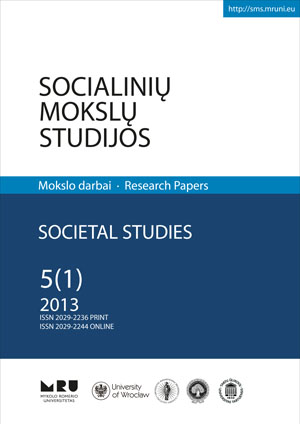Kultūros ir jos sintezės refleksija XIX a. pab. – XX a. pr. lietuvių inteligentų pasaulėžiūroje
Reflection on Culture and Its Synthesis in the World Outlook of Lithuanian Intellectuals at the End of the 19Th C. and Beginning of the 20Th C
Author(s): Margarita PoškutėSubject(s): Social Sciences
Published by: Mykolas Romeris University
Keywords: culture; science; neo-Thomism; Positivism; Romanticism
Summary/Abstract: Processes of globalization rapidly reduce the boundaries between traditional science fields and thus create new challenges for the creators of these sciences i.e. contemporary humans. Despite the unprecedented degree of globalization during the last century, this process is not new. Therefore, the constant need for rethinking of cultural and historical heritage emerges. This article explores the period from the end of the 19th c. to the beginning of the 20th c., when professional philosophy was not developed for objective reasons, but intellectuals of different views (both Catholic and secular) sought to reflect on contemporary processes. Even though at the end of 19th century the most relevant issues were those of nationality , the problems of culture and questions on interaction between different fields of culture were also discussed at that time. The article discusses the question of what kind of culture and science should exist to develop a mature and balanced personality. This question is discussed from a historical perspective. Three different prevailing world outlooks can be distinguished during the end of the 19th and the beginning of the 20th centuries. Materialists (positivists, socialists) denied all spiritual science as minor, if not useless or even harmful, As the only goal, i.e. to solve contemporary (social) problems, for science was set, then only sciences which provide accurate and useful knowledge are needed. Therefore, the importance of the humanities or other fields approaching spiritual culture is rejected. The clergy denied such a single sided view of culture. For them not only a material and, thus, scientific interpretation of the world was not acceptable, but also was a single sided idealistic reasoning of culture held by supporters of the romantic views. While holding neo-Thomistic views and often combining them with the ideas of V. Solovyov, the clergy had no doubt about the possibility of holistic understanding of the world which could unfold the versatility of the being. However, such comprehensiveness is not an end in itself, it is indispensable for creation of a balanced, moral human. The final goals of positivists, Marxists and neo-Thomists became paradoxically similar: culture, according to neo-Thomists and science, according to positivists, must lead to the ideal state of humanity. In fact, the clergy speaks of a balanced individual and positivists and Marxists speak of anonymous, unified humanity united by common scientific or social ideals. Consequently, the question emerges whether by reducing the limits between regions, cultures and thus by merging entirely different areas we could maintain the diversity. In this case the Romanticists, who emphasize the originality and uniqueness referring to language as the main source of culture, are exceptional. Also the neo-Thomists, who sought for synthesis of all fields of culture, noticed the distinctions of these fields which could not be eliminated.
Journal: Socialinių mokslų studijos
- Issue Year: 5/2013
- Issue No: 1
- Page Range: 75-85
- Page Count: 12
- Language: Lithuanian

